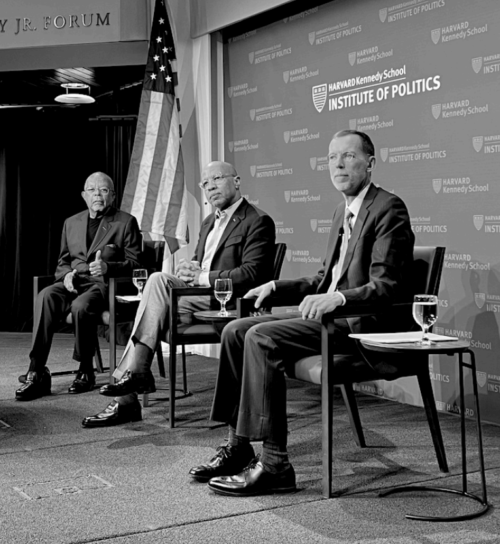“Social justice is the notion that every person deserves to live with dignity,” Darren Walker proclaimed to the packed audience attending the JFK Jr. Forum at the Institute of Politics. On February 21st, 2023, Walker, alongside Douglas Elemendorf and Henry Louis Gates Jr, joined the Harvard Kennedy School and the Hutchins Center for African American Research for a conversation entitled “Philanthropy and Social Justice.”
The discussion was centered around the life and journey of Walker, who currently serves as president of the Ford Foundation, an organization dedicated to investing in global issues and bringing about social change. Gates— current professor, filmmaker, and director of the Hutchins Center—presented questions to Walker. Elmendorf, the Dean of Public Policy at the Harvard Kennedy School, moderated the event.
Walker began by explaining his background, framing his life’s journey as a complete circle. In 1965, Walker was enrolled in the first class of Head Start, a program which serves disadvantaged children and families through access to early childhood education, health, and childcare services. “The actual piloting work of Head Start was a Ford Foundation grant,” said Walker. Impacted by philanthropic efforts at such a formative age, Walker has dedicated his life’s work to the service of others.
Walker transformed the Ford Foundation’s mission to add additional focus on inequality and social justice. Walker said, “The way in which inequality takes hold in a society through policy that continues to marginalize. Our mission was in par to strengthen democracy…Inequality asphyxiates hope [and] hope is the oxygen of democracy.”
Walker also proposed his own definition of philanthropy, citing leaders such as Martin Luther King Jr., Carnegie, and Rockefeller as those who shaped his perception of the cause. “[You must] interrogate your complicity in the very thing you profess to solve. It just for me had a profound impact on how I thought about the work of philanthropy and the work of an institution like Ford. What are you gonna use this privilege for?” Walker asked. “It is looking at society through the lens of systemic [and] structural privilege that advantages the already advantaged, and disadvantages the already disadvantaged.”
Walker’s definition of philanthropy and his approach toward social change as a means to pay attention to what is uncomfortable also stems from his pro-capitalist beliefs.
Walker called out the systems that were built upon racist, predetermined outcomes and denounced common hypocrisies in modern philanthropy. “Why is anyone surprised that our prisons are black, brown, and poor white people? Why is our housing so segregated? Why would an educational system have such inequity?”
“To me, philanthropy’s role is to interrogate and engage in our own complicity. The Ford Foundation cannot be one of the largest investors in the reform of our criminal justice system and have endowment that invests in private prisons,” Walker explained. In philanthropy, I would love to say that that contradiction does not exist but that would not be truthful. That contradiction has existed, and there are similar contradictions.”
This particular forum took three years to put together due to the interruption of the COVID-19 pandemic, according to Elemndorf. Elemendorf was excited to get the event back on the calendar, as he feels its topic directly aligns with the philosophy of the Kennedy School: “Professor Gates proposed this [forum] three and a half years ago. Darren Walker had just finished a book about a new approach to philanthropy. The Kennedy School’s mission is to advance public interest and serve broad public services. Civil society philanthropy is an important element of that, so this was a topic that was right at the heart of the Kennedy School’s work.”
Students in attendance were intrigued by various points and explanations Walker made throughout the conversation. “Something that I thought was really interesting was he said that the best way to give back to different communities was not partnering with elite institutions. Even though most people believe that those institutions have the most power…the Ford Foundation has been making more efforts to partner with more grassroots and community-based organizations that are actually working on the ground,” stated Tsion Debebe ’26.
Debebe also found interest in Walker’s claims regarding social justice research, and how the sufficient research that has been done is ignored by companies, meaning philanthropy needs to be more involved. “[He said that] the reason that it is not being put into action is because a lot of companies are not investing into those issues.”
Others were surprised at some of Walker’s opinions. Walker is a self-declared capitalist and believes capitalism should be an inclusive form. “He embraced the thought process of Carnegie and [other] titans of industry that some could argue had too much wealth…[It was surprising that] as someone who was in charge of doing so much work to give back to others, he was so willing to embrace the thought process of titans of industry,” said Jonathan Haileleselaisse ’26.
Audience questions at the end of the forum included topics such as philanthropy for children’s causes, further investment toward equality for those with disabilities, and the responsibility of wealthy institutions. Walker was also asked to give advice to a student seeking a career in philanthropy and service, to which he responded “Do the work that allows you to have connections with something you are passionate about.”
Gates’ and Walker’s discussion explored what philanthropy truly is, and its intersection with social justice. Walker’s takes diverge from what seems to be the predominant take in modern philanthropic practices, as do his beliefs surrounding capitalism and how we can use privilege to effect change in a profound way. “We need to interrogate our own engagement in these issues and that makes us really uncomfortable,” Walker said. “One of the great things about privilege is that privilege and wealth insulate you from being uncomfortable. It’s the whole idea of privilege.”
Layla Chaaraoui ’26 (laylachaaraoui@college.harvard.edu) writes News for the Independent.

